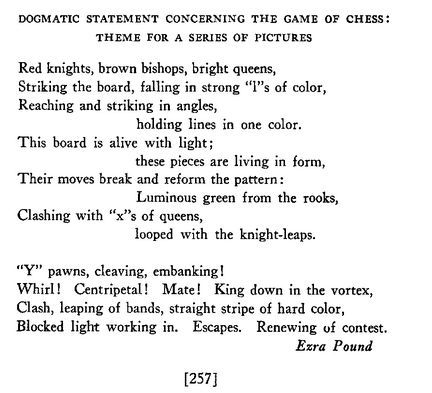Thank you for article!
Our Poets Corner
Why would I sound desparate? I didn't write the poems.
That's what you want us to think.
No, what I want is to familiarize people who have interest in such things with an unusual but fascinating chess personality. What anyone thinks is somewhat irrelevant to me.
No, what I want is to familiarize people who have interest in such things with an unusual but fascinating chess personality. What anyone thinks is somewhat irrelevant to me.
Again, that's what you want us to think
But your secret motivation still remains unclear.
This reminds me of Ezra Pound poem.
The Game Of Chess
THEME FOR A SERIES OF PICTURES
Red knights, brown bishops, bright queens,
Striking the board, falling in strong ‘L's of
colour.
Reaching and striking in angles,
holding lines in one colour.
This board is alive with light;
these pieces are living in form,
Their moves break and reform the pattern:
luminous green from the rooks,
Clashing with ‘X's of queens,
looped with the knight-leaps.
‘Y' pawns, cleaving, embanking!
Whirl ! Centripetal ! Mate ! King down in the
vortex,
Clash, leaping of bands, straight strips of hard
colour,
Blocked lights working in. Escapes. Renewal of
contest.
I
In their solemn corner, the players move
The slow pieces. The board detains them
Until the dawn in its severe world
In which two colors hate each other.
Within the forms irradiate magic
Strictness: Homeric rook, swift
Knight, armed queen, hintermost king,
Oblique bishop and aggressor pawns.
Once the players have finally left,
Once time has devoured them,
Surely the ritual will not have ended.
In the orient this very war flared up
Whose amphitheater today is the earth entire.
Like the other, this game is infinite.
II
Weakling king, slanting bishop, relentless
Queen, direct rook and cunning pawn
Seek and wage their armed battle
Across the black and white of the field.
They know not that the player’s notorious
Hand governs their destiny,
They know not that a rigor adamantine
Subjects their will and rules their day.
The player also is a prisoner
(The saying is Omar’s) of another board
Of black nights and of white days.
God moves the player, and he, the piece.
Which god behind God begets the plot
Of dust and time and dream and agonies?
Translation: Frank Thomas Smith
Note: In the original Spanish there is a rhyming scheme impossible (for me) to duplicate.
Español
The poet is Edit: Jorge Luis Borges. He reads these two poems on. YouTube video.
The most intriguing part to me in this poem is in the last line , where Borges asked, Which god behind God begets the plot of dust and time and dream and agonies?
This reminds me of Ezra Pound poem.
Thanks for the poem!
It was originally published in "Poetry Magazine," March 1915:

The poet is Jorge Luis Borges.
Thanks for the Borges' poem. He was well known for his love of chess.
Here are a couple statement of Borges on chess:
"So I don't know whether these tastes mean anything. It's like my taste for coffee, which I never thik of reasoning out, or a taste for chess, though I am the worst player."
"...the kind of pleasure you get, let's say, from a chess puzzle or from a good detective novel."
This week I published an article (reworked thoroughly), called Talks a Good Game, originally published by a man named, among other things, Paul Hugo Little. This article followed up an earlier article all about Little, called The Man With 1000 Names. Little was an intriguing man who wrote, among other, less savory things, chess articles in the 1930s.
While this probably seems like shameless self-promotion, it is, in fact just a lead in to another area of PH Little's writing — Poetry, which I wanted to post here with a "little" introduction.
The verses below were published in "Chess Review" under the title "Our Poets Corner" :
MONOLOGUE
"Mate me!"
I tell hm when we play,
As if to ease his stubborn way.
For full twenty years
We have fought.
But for him
All his lore has come to naught
As he peers,
Ever venerably grim,
At the Dusty board.
Hate me?
What does he know of hate?—
He who is comtent to wait
For a solitary "check!"
With no harm
Done to me
He, thinking to cause alarm,
Cranes his neck
* * * * * * * *
THE MASTER PLAYER
Choosing earth to be his board,
He took into His hands clay,
Eased it in His divine way,
Shaped both King and pawn, and then
Said, "Take form!" and had chessmen!
* * * * * * * *
TRIOLET
Play the Game although you lose.
Prestige? Courage means for more.
Move your pieces as you chose.
Play the game! Although you lose.
You will hear your foes enthuse;
Let them, not you, add your score.
Play the game, although you lose
Prestige. Courage means for more.
* * * * * * * *
CHESS FIGURES
M A N
(Translated from the Arabic)
What is it to be a man?
A wraith and wisp, earth blown,
A hulk and a bone full grown,
A star in the night of time,
A clang or a changing rhyme,
A thread, 'twixt the past and the new,
A leaf on a rotting bough,
A gust of wind 'gainst a rustling tree,
An ion in immensity:
A foul breath,
A sudden death,
A sob.
* * * * * * * *